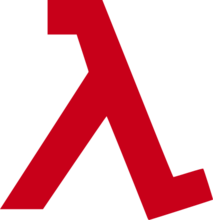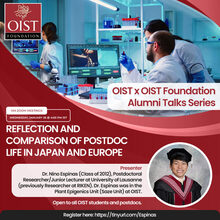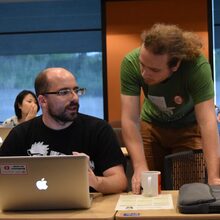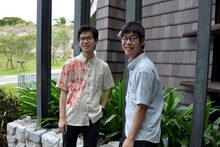Past Events
(Somewhat) Functional Journal Club
2022年3月1日 (火) 16:00 〜 17:00OIST NetCafé (大学院説明会) 2022年2月
2022年2月10日 (木) 10:00今回の特別版OIST Caféは、国連が提唱する「科学における女性と女児の国際デー」を記念して行われます。OISTが女性研究者や学生をどう支援しているのかの紹介や、現在博士課程学生やポスドクとしてOISTに所属している女性がそれぞれの経験をシェアし、参加者と共に共通の課題や悩みについて議論する場となります。パネルディスカッションでは、参加者が直接登壇者にリアルタイムで質問できる機会を設けています。
また、今回はジョンズ・ホプキンス大学(米国)公衆衛生大学院 特別栄誉教授およびメリーランド大学特別栄誉教授であるリタ・コルウェル博士も登壇予定です。コルウェル博士は米国国家科学技術会議(NSF)にて、初の女性共同議長を務めました。
[Resume Workshop] Crafting an effective Resume
2022年1月27日 (木) 13:30 〜 15:00[Resume workshop] - Crafting an effective Resume
Join us for the “Crafting an effective Resume” workshop to discover how you can utilize these strategies to make your application more focused, tailored, and relevant.
OIST Alumni Talks - Nico Espinas
2022年1月26日 (水) 16:00 〜 17:00OIST Alumni Talks
Name: Dr. Nino Espinas (Class of 2012)
Talk Title: Reflection and Comparison of Postdoc Life in Japan and Europe
Winter Admissions Selection 2022
2022年1月24日 (月) (All day) 〜 2022年2月11日 (金) (All day)Online Admissions Selection for shortlisted PhD applicants from January 24th to February 11th, 2022.
Information sessions about PhD program, faculty talks and interviews all via zoom.
The event is targeted towards shortlisted applicants for our PhD program.
Please contact phd-selection@oist.jp for further details.
Mini Course: Speeding up MATLAB (by MathWorks) 2 of 2
2022年1月14日 (金) 10:00 〜 12:00This Mini Course will be taught by engineers from MathWorks, the company developping MATLAB. The focus will be on accelerating MATLAB code, using different approaches: better general coding practices, using the Parallel Computing Toolbox, and using Deigo's resources.
◆Target audience
This course is suitable for people with some experience with MATLAB. Ideally, the participants will already have some code that they are interested in speeding up.
Mini Course: Speeding up MATLAB (by MathWorks) 1 of 2
2021年12月17日 (金) 10:00 〜 12:00This Mini Course will be taught by engineers from MathWorks, the company developping MATLAB. The focus will be on accelerating MATLAB code, using different approaches: better general coding practices, using the Parallel Computing Toolbox, and using Deigo's resources.
◆Target audience
This course is suitable for people with some experience with MATLAB. Ideally, the participants will already have some code that they are interested in speeding up.
[PhD Thesis Presentation_Zoom]-Masakazu Taira- Investigation of serotonergic regulation of reward-based behaviors
2021年12月8日 (水) 16:00 〜 17:00PhD public presemtation
OIST NetCafé (大学院説明会) 2021年12月
2021年12月3日 (金) 14:00言語は日本語で行われます。OISTの博士課程やリサーチインターン、それぞれの出願プロセス、入学後の流れ、経済支援、大学院生活などが紹介され、ゲストスピーカーとして、OISTの現役博士課程学生2名が登壇します。パネルディスカッションでは参加者が直接学生に質問ができます。
[PhD Thesis Presentation_Zoom] - Xunwu Hu - "Developing Integrin-targeted Peptide Assemblies to Direct Cancer Cell migration"
2021年12月3日 (金) 9:00 〜 10:00PhD Public Presentation













